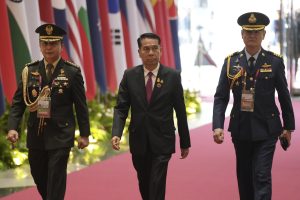Among Thailand’s current ministers, many of whom are familiar faces from the predecessor administration, one notable newcomer is Defense Minister Sutin Klungsang. Like Prime Minister Srettha Thavisin, Sutin belongs to Pheu Thai, the largest governing party.
In an era of heightened global insecurity and mounting domestic calls for military reforms, whoever assumes Thailand’s top defense job will naturally draw attention. But Sutin’s norm-breaking arrival has been especially intriguing. Whereas Thailand’s past defense ministers were (predominantly) men in uniform and (rarely) civilians concurrently serving as prime ministers, Sutin is just a veteran politician from Thailand’s rural northeastern constituency, who has zero defense background and has long been an outspoken opponent of military rule.
In a Fulcrum article I co-authored with Ian Storey of the ISEAS-Yusof Ishak Institute last September, we posited that Sutin’s appointment is a manifestation of the peculiar alliance between Pheu Thai and its military-conservative rivals that made up the previous government. Therefore Sutin, while promoting changes, will prioritize his party’s political survival and is unlikely to majorly challenge the armed forces.
New developments since then have reinforced our assessment. Look no further than Thailand’s messy submarine procurement. As already extensively covered, China has been unable to equip one of its S26T Yuan-class submarines sold to Thailand with the German MTU engines as agreed in the contract. This setback has prompted authorities to consider alternatives, including China’s proposal to substitute German engines with Chinese CHD 620 engines, though they lack a proven safety record.
Sutin, for his part, has favored shelving the problematic submarine and purchasing an alternative instead. Accepting Chinese engines would only be awkward, considering that the issue surrounding them was first raised by Sutin’s Pheu Thai colleague two years ago, back when the party was leading the opposition.
Almost immediately after taking office, Sutin suggested two alternative purchases from Beijing: fertilizers and a frigate. The first suggestion, intending to help struggling Thai farmers, is silly and long-forgotten, but one that’s worth mentioning because it reflects Pheu Thai’s strong populist platform. The second suggestion, backed by Srettha, is being taken much more seriously. All the long-term strategic and operational flaws aside, the general idea of a frigate alternative makes sense. China-Thailand relations won’t be significantly damaged, and this solution should satisfy the Royal Thai Navy (RTN), which is seeking more advanced frigates to guard the kingdom’s maritime interests.
Yet the submarine has bounced back as the central focus in 2024, with Sutin initiating a submarine review committee in January and telling reporters earlier this month that getting alternative ships is no longer feasible. The latter echoes the words of Thailand’s navy chief, Admiral Adung Phan-iam, that “the service is looking to carry out the former navy chiefs’ policy and fulfill the navy’s strategy, which envisions submarines as a deterrent.” It won’t be long until the final answer is revealed, but signs are pointing to the strong likelihood of the RTN acquiring its long-desired submarine.
Concerning matters of military reforms, Sutin has defended his ministry’s decision against budget cuts, arguing that the defense budget is already lower than those of other key ministries, and that comparing this year’s budget to previous years is unwise due to unique external circumstances. And, despite pushing for personnel reduction through an early retirement program and the merging of units, Sutin has underscored the need to proceed cautiously, believing that rapid downsizing could hurt “troop morale.”
Coming from humble beginnings himself, Sutin has demonstrated efforts to ensure the welfare of lower-ranking troops. In response to the recent surfacing of a video featuring a conscripted soldier complaining about being forced to do chores for his superior – something of an open secret in Thailand – Sutin was quick to state that the responsible officer would be disciplined, and even encouraged other coerced soldiers to come forward. Again, Sutin promptly criticized the RTN for an incident last week in which a warship accidentally opened fire on another frigate, causing injuries to 14 non-commissioned officers.
The cases above are intertwined with Sutin’s apparent keenness to improve military-to-public communications. He discussed this issue in his latest interview, pointing out that the military must rethink its “actions over words” mentality to better fit in with today’s fast-paced world of social media.
Sutin could ultimately be remembered through divergent lenses. Those prioritizing meaningful military reforms will characterize him as an appeaser with no real authority. Those less keen on large-scale military reforms, or at least thinking that such acts are not viable when confronted with an unstable security environment, as well as those recognizing the complexity of Thailand’s civil-military relations, might give Sutin a more positive assessment. For them, Sutin could perhaps be described as a bridge between senior military leaders who often struggle with communication, lower-ranking soldiers and conscripts who may feel left out, and the general Thai public that demands more transparency.
The anticipated cabinet shuffle, however, could turn Sutin’s reputation for the worse.
Rumors have been circulating that as part of the political “deal” that has set free former prime minister Thaksin Shinawatra (and his sister, Yingluck, might follow suit), Pheu Thai may soon need to cede both the premiership and defense ministry. The new – and real – defense minister would be someone in uniform, and likely ultra-conservative. If this turns out to be true, Sutin will be remembered by most people as nothing more than a transitionary civilian defense minister, who was only chosen because of his surname, which literally translates as armory.

































